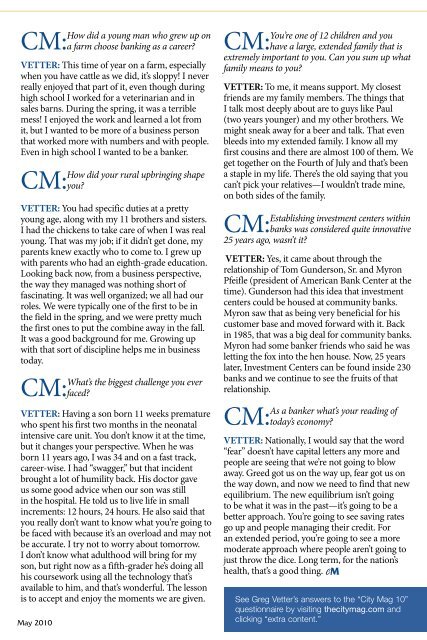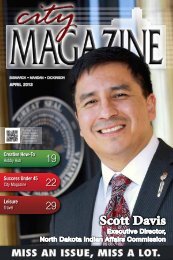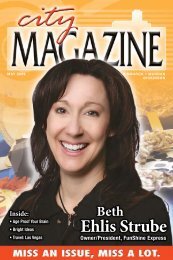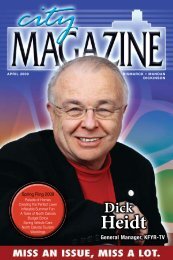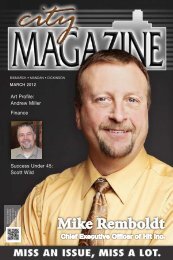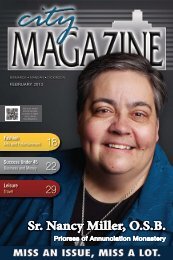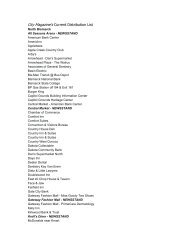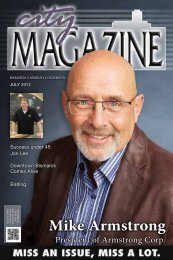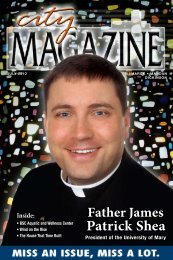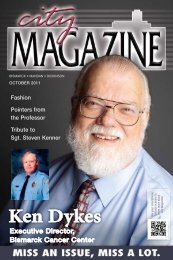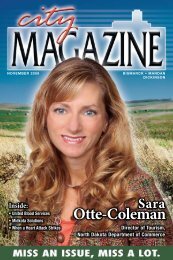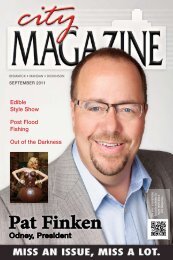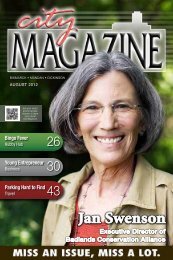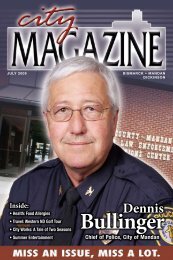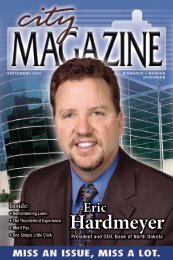Banker Greg Vetter - City Magazine
Banker Greg Vetter - City Magazine
Banker Greg Vetter - City Magazine
You also want an ePaper? Increase the reach of your titles
YUMPU automatically turns print PDFs into web optimized ePapers that Google loves.
How did a young man who grew up on<br />
CM: a farm choose banking as a career?<br />
VETTER: This time of year on a farm, especially<br />
when you have cattle as we did, it’s sloppy! I never<br />
really enjoyed that part of it, even though during<br />
high school I worked for a veterinarian and in<br />
sales barns. During the spring, it was a terrible<br />
mess! I enjoyed the work and learned a lot from<br />
it, but I wanted to be more of a business person<br />
that worked more with numbers and with people.<br />
Even in high school I wanted to be a banker.<br />
How did your rural upbringing shape<br />
CM: you?<br />
VETTER: You had specific duties at a pretty<br />
young age, along with my 11 brothers and sisters.<br />
I had the chickens to take care of when I was real<br />
young. That was my job; if it didn’t get done, my<br />
parents knew exactly who to come to. I grew up<br />
with parents who had an eighth-grade education.<br />
Looking back now, from a business perspective,<br />
the way they managed was nothing short of<br />
fascinating. It was well organized; we all had our<br />
roles. We were typically one of the first to be in<br />
the field in the spring, and we were pretty much<br />
the first ones to put the combine away in the fall.<br />
It was a good background for me. Growing up<br />
with that sort of discipline helps me in business<br />
today.<br />
What’s the biggest challenge you ever<br />
CM: faced?<br />
VETTER: Having a son born 11 weeks premature<br />
who spent his first two months in the neonatal<br />
intensive care unit. You don’t know it at the time,<br />
but it changes your perspective. When he was<br />
born 11 years ago, I was 34 and on a fast track,<br />
career-wise. I had “swagger,” but that incident<br />
brought a lot of humility back. His doctor gave<br />
us some good advice when our son was still<br />
in the hospital. He told us to live life in small<br />
increments: 12 hours, 24 hours. He also said that<br />
you really don’t want to know what you’re going to<br />
be faced with because it’s an overload and may not<br />
be accurate. I try not to worry about tomorrow.<br />
I don’t know what adulthood will bring for my<br />
son, but right now as a fifth-grader he’s doing all<br />
his coursework using all the technology that’s<br />
available to him, and that’s wonderful. The lesson<br />
is to accept and enjoy the moments we are given.<br />
You’re one of 12 children and you<br />
CM: have a large, extended family that is<br />
extremely important to you. Can you sum up what<br />
family means to you?<br />
VETTER: To me, it means support. My closest<br />
friends are my family members. The things that<br />
I talk most deeply about are to guys like Paul<br />
(two years younger) and my other brothers. We<br />
might sneak away for a beer and talk. That even<br />
bleeds into my extended family. I know all my<br />
first cousins and there are almost 100 of them. We<br />
get together on the Fourth of July and that’s been<br />
a staple in my life. There’s the old saying that you<br />
can’t pick your relatives—I wouldn’t trade mine,<br />
on both sides of the family.<br />
Establishing investment centers within<br />
CM: banks was considered quite innovative<br />
25 years ago, wasn’t it?<br />
VETTER: Yes, it came about through the<br />
relationship of Tom Gunderson, Sr. and Myron<br />
Pfeifle (president of American Bank Center at the<br />
time). Gunderson had this idea that investment<br />
centers could be housed at community banks.<br />
Myron saw that as being very beneficial for his<br />
customer base and moved forward with it. Back<br />
in 1985, that was a big deal for community banks.<br />
Myron had some banker friends who said he was<br />
letting the fox into the hen house. Now, 25 years<br />
later, Investment Centers can be found inside 230<br />
banks and we continue to see the fruits of that<br />
relationship.<br />
As a banker what’s your reading of<br />
CM: today’s economy?<br />
VETTER: Nationally, I would say that the word<br />
“fear” doesn’t have capital letters any more and<br />
people are seeing that we’re not going to blow<br />
away. Greed got us on the way up, fear got us on<br />
the way down, and now we need to find that new<br />
equilibrium. The new equilibrium isn’t going<br />
to be what it was in the past—it’s going to be a<br />
better approach. You’re going to see saving rates<br />
go up and people managing their credit. For<br />
an extended period, you’re going to see a more<br />
moderate approach where people aren’t going to<br />
just throw the dice. Long term, for the nation’s<br />
health, that’s a good thing.<br />
See <strong>Greg</strong> <strong>Vetter</strong>’s answers to the “<strong>City</strong> Mag 10”<br />
questionnaire by visiting thecitymag.com and<br />
May 2010<br />
clicking “extra content.”<br />
7


